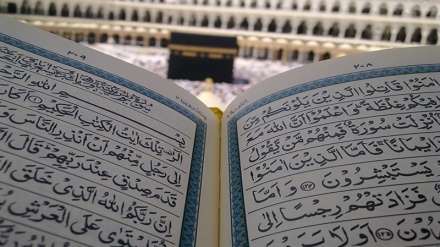Path towards Enlightenment (1014)
Salaam, and welcome to our latest episode of “Path towards Enlightenment”, which is an endeavour to make you and us familiar with an easy and fluent explanation of God’s Final Scripture to all mankind, the holy Qur’an that was revealed to the Last and Greatest of all Messengers, Prophet Muhammad (blessings of God upon him and his progeny).
A fortnight ago, we completed explanation of “Surah Taghabun” and this Friday we embark on explanation of the next Surah, that is, “Surah Talaq”, which is number 65 in the serial order of compilation of the holy Qur’an.
Revealed in Medina it has 12 Ayahs it outlines the lawful procedures by which a Muslim couple may divorce and that calls for fair parting between the husband and wife if marriage is to end, in accordance with what is right and within God’s prescribed limits, while promising ease and deliverance for the truly God-fearing who undergo this trauma. The surah strongly urges people to observe God’s regulations and guidance. To reinforce this point they are reminded of the fate of earlier disobedient nations as well as the rewards of the obedient. The Surah also emphasizes God’s Power and Knowledge of everything.
Here we recite the opening Ayah of this Surah:
“In the Name of Allah the All-Compassionate the All-Merciful – O Prophet! When you (Muslim men) divorce women, divorce them at their prescribed period (i.e. while not menstruating or having intercourse with the husband) and calculate the period, and be wary of Allah your Lord. Do not turn them out from their houses, nor shall they go out, unless they commit a gross indecency. These are Allah’s bounds, and whoever transgresses Allah’s bounds certainly wrongs himself. You never know maybe Allah will bring off something new later on.”
Islam puts high emphasis on marriage and formation of family. In some cases, however, conjugal life becomes unbearable for one or both the couple. In such a case Islam has permitted divorce but with certain conditions and ethical bounds. The Ayah though addressing the Prophet sets the rule for Muslims. It is mentioned elsewhere in the Holy Qur’an that the prescribed time is specified as the passage of three menstrual periods, which is called “iddah” or the waiting period, to enable either reconciliation or formal divorce, so as to ensure the women is not pregnant and can remarry. It is worthy of note that men are responsible for providing women with alimony and accommodation expenses during this three month period, and should not force the woman to leave the house. The woman for her part should refrain from committing gross indecent acts during this waiting period, including mistreatment and slandering the husband and in-laws that may lead to further problems. The Ayah cautions against transgressing the limits set by God Almighty, since these injunctions guarantee the interests of the couple, especially in case of having children, for whose sake the divorce can be revoked by the husband and wife after emotions have subsided. Thus, in the closing words of the Ayah the Almighty Creator says positive things might develop of which you are not aware.
From this Ayah we learn that:
- Marriage is highly emphasized by Islam for building a sound and healthy family unit, but if matters become unbearable, divorce is permitted on certain conditions and within ethical bounds.
- In case of separation, the couple should not be despondent and place their trust in God for a better future.
- The rights of the divorced wife should be fully observed during the waiting period by the ex-husband who is responsible for alimony and other expenses.
- Even after divorce, the couple should maintain good conduct with each other for the sake of children, and possible reconciliation after emotions have subsided.
We now invite you to listen to Ayahs 2 and 3 of the same Surah:
“Then when they have completed their term, either retain them honourably or separate from them honourably, and take the witness of two fair men from among yourselves, and bear witness for the sake of Allah. To [comply with] this is advised whoever believes in Allah and the Last Day. And whoever is wary of Allah, He shall make a way out for him; and provide for him from where he does not reckon. And whoever puts his trust in Allah, He will suffice him. Indeed Allah carries through His command. Certainly Allah has set a measure for everything.”
These Ayahs continue that at the end of the three-month waiting period, the couple can either revoke the divorce or formalize it honourably with two fair-minded persons as witness to the formal separation. If Divine Laws are observed, the Almighty Creator will certainly show a decent way out and provide from where no one has any idea about.
From these ayahs we learn that:
- The presence of two just witnesses at the time of divorce shows that Islam pays high attention to the rights of couples.
- The only way to get out of dead ends and crises is to be Godwary and place trust in the Almighty Creator.
Now let us listen to ayahs 4 and 5 of Surah Al-Ṭalāq:
“And as for those of your wives who do not hope to have menses, should you have any doubts, their term shall be three months, and for those [as well] who have not yet had menses. And as for those who are pregnant, their term shall be until they deliver. And whoever is wary of Allah, He shall grant him ease in his affairs. That is the ordinance of Allah, which He has sent down to you, and whoever is wary of Allah, He shall absolve him of his misdeeds and give him a great reward.”
In continuation of the conditions for observing the three-month waiting period for the woman during divorce, these Ayahs set the law for three groups of women, that is, those who have no menstrual period; those who do not have the period due to a disease; and those who are pregnant. The first and the second groups should observe the three-month term before finalization of divorce and formal separation. For the third group in case of pregnancy, the woman is required to wait till the birth of the child for formalization of the divorce and should not marry another person. Here it has been stressed four times to observe Godwariness, with promises of great rewards for the faithful.
These Ayahs teach us the following points:
- Divine laws differ according to the conditions of individuals in harmony with human nature and the Infinite Mercy of the Almighty Creator.
- A child has rights even if it is in the mother’s womb, which means a pregnant woman cannot marry another man, until after delivery.
- Whether in conjugal life or in the case of divorce it is Godwariness which guarantees the solving of all problems.
RM/AS/SS


